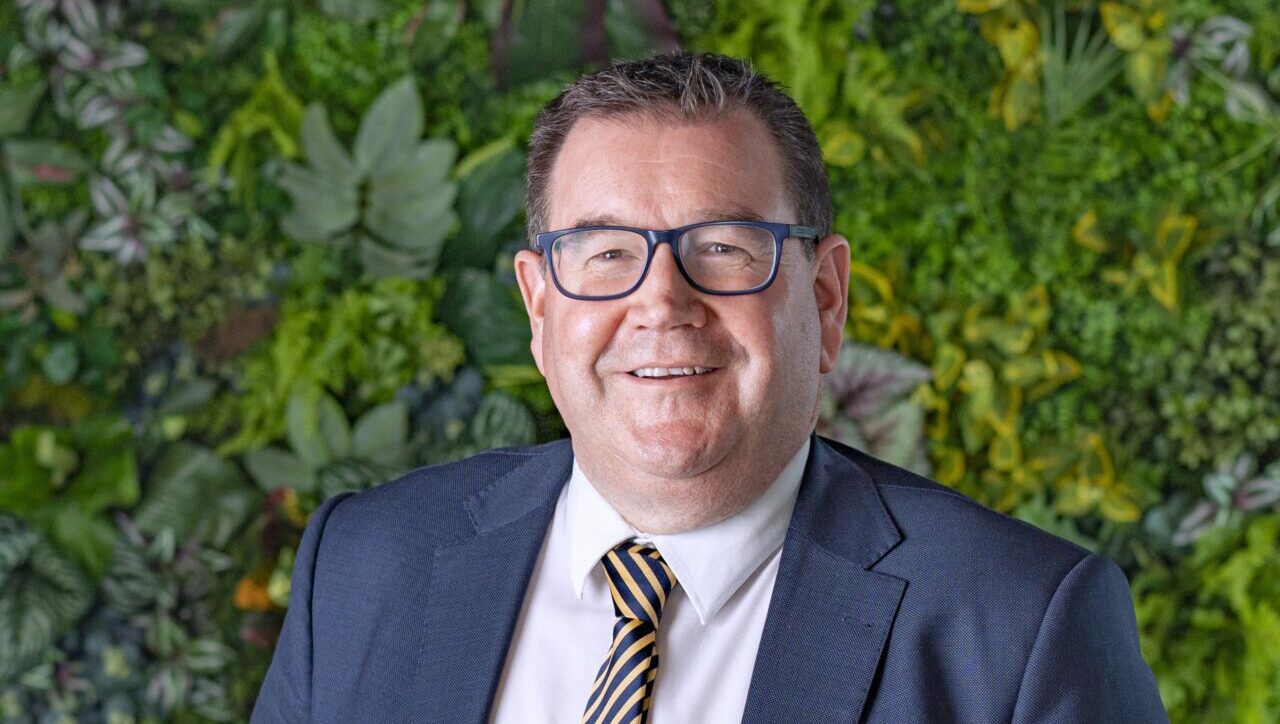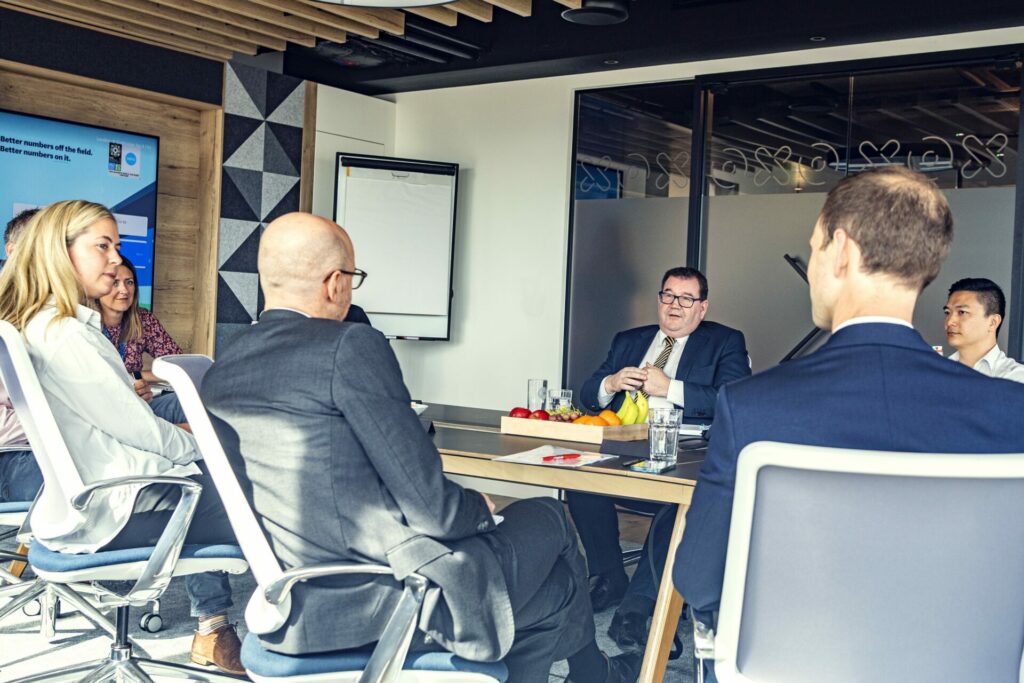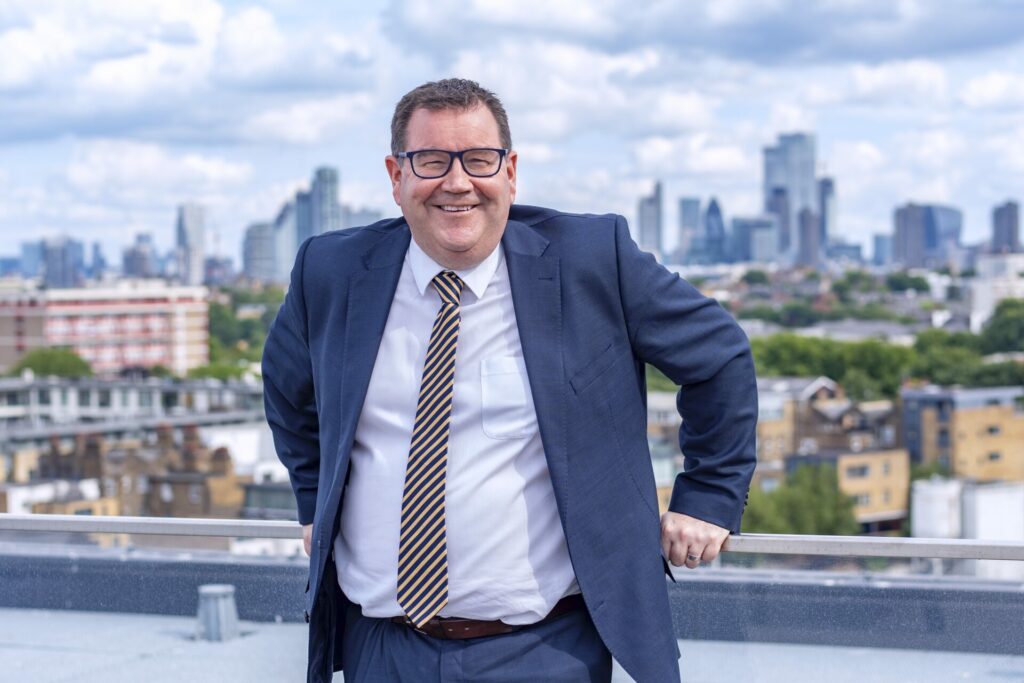New Zealand’s Grant Robertson warns against ‘bogus theories’ on trans issues
New Zealand's Deputy Prime Minister chats to Attitude about possibly becoming the country's first gay prime minister and what advice he has for the UK government.

This article first appeared in the November/December 2022 issue. Get it here.
“You’re hired!” is the phrase that springs to mind, The Apprentice-style, as Grant Robertson strikes a pose against a polished London skyline for his Attitude shoot. Although, as the Deputy Prime Minister of New Zealand, an Apprentice Aotearoa backdrop might be more fitting. (What is that, exactly? Magnificent mountains, fjords, and glaciers, à la Lord of the Rings?)
We meet Robertson — who is also Minister of Finance — at the London branch of New Zealand-based tech company Xero, which makes cloud-based business accounting software. In its shiny office block, he’s just wrapped a round-table meet with several Kiwi start-ups, an event he describes as “one of the highlights” of his trip.
Robertson is on a 12-day visit to Blighty. “New Zealand is reopening to the world [after Covid-19],” he explains. “It’s important to get to the UK, meet with businesses and politicians, and ensure people know we’re here.”
Lest we forget, his home nation — led by Prime Minister Jacinda Ardern — had one of the most successful responses to the pandemic, thanks in part to an aggressive early lockdown.
As Robertson wears another hat as the Minister of Sport and Recreation, he’s also in the UK to support New Zealand athletes at the Birmingham 2022 Commonwealth Games, “a pinnacle event”. “The government puts quite a lot of money into sport, so it’s good to go along and both support our team but also have a look at where our investment’s gone,” he tells me.

Securing an audience with Attitude was high on the 50-year-old’s list of priorities, too: he approached us for an interview after we honoured him in our inaugural 101 issue of influential LGBT+s in 2020. We gladly accepted: rare is the politician who takes the initiative in engaging with the queer press.
Robertson’s easy-going nature stands in stark contrast to that of his British peers. When we meet, the Conservative leadership race is hotting up, with the supremely awkward Liz Truss (look up her cringe-inducing speech about British cheese, and the look on her face when she says: “That. Is. A. Disgrace!”) and the wily Rishi Sunak (Google his photo on Number 11’s staircase for an insight into how image- conscious he is) dominating the press. Who is Robertson backing?
“We tend not to express our views on those matters,” he tactfully replies. “We’ll work with whoever gets elected, and it’s therefore probably not in anyone’s interest for me to speculate. What I would say is, it is really important politicians are held to account about their record, especially from the LGBT+ community; holding anyone who wants to be leader of a country to account about whether or not they’ll stand up for the rights of those minority communities.”
Here, Robertson — who is gay and entered a civil union ceremony with husband Alf Kaiwai in 2009 (“he had two children when we met — I inherited them and then we ended up with four grandkids!”) — discusses everything from online hate to whether he sees himself taking the top job one day…
What steps is New Zealand taking towards LGBT+ equality?
We’ve been really pleased to have made some good progress over the past few years. We got marriage equality over the line [in 2013]. We passed a law removing convictions for people convicted before homosexual law reform. In this term of Parliament, just recently, we passed a law banning ‘conversion therapy’ practices.
Ahead of the UK on all of those points!
Yeah… And look, it’s important to keep making progress. For me, three things stand out. The first: making sure our trans community is fully supported. In New Zealand law, under our Human Rights Act, [you can’t be discriminated against because of your] gender identity.
We’ve had work done by our Human Rights Commission that says, look, it’s kind of covered already by sexual orientation. But I think now we know that’s probably not good enough. And so, there’s a legal framework, but then there’s the practical provision of support and services and the budget.
As Minister of Finance, we had some money to expand health services available to the trans community and our intersex community, who are often overlooked. We’ve got to keep making sure that, in an environment where, you know… I’m hearing some of the language being used about the trans community that’s very familiar; an echo of what the gay community dealt with some decades ago.
The second area is around safety in schools. We’ve got a bit more work to do to make sure they are really inclusive, safe environments. We’ve made progress in that space, but I’d like to see us do more. And then, more broadly, access to strong, affirmative services: health services being one, but also housing. Like all countries, we’re dealing with issues like homelessness. For young queer people, homelessness is a specific issue.
Can you share your coming-out story?
I don’t think it ever ends! One of the things about being in public life is people make assumptions about you. I was in my late teens when I began talking about my sexuality with friends. I wasn’t comfortable to really be myself until I moved to another place. I decided to tell my parents when I was in my second year of university. I organised to go and have dinner with them, and my father, unfortunately, ended up being arrested for theft the week before. So, I parked it for a little while — I thought the family had enough to deal with! I told my mother and delayed telling my father until he got out of prison. They were incredibly accepting. But it was the early 90s. I think my mother’s fear, like a lot of parents at that point, was HIV and Aids.
As a public figure do you experience homophobia?
Not to a great extent. But my social media feed is littered with homophobic comments from people on a particular part of the political spectrum. But in day-to-day life, I’m pretty fortunate — it isn’t a major issue.
And in a political space?
Many years ago, I ran to be Labour Party leader, and certainly in the first of those leadership elections, my sexuality was quite a big focus. There was this “Is New Zealand ready for a gay Prime Minister?” I don’t know what that means!
How would you describe the diversity and inclusion in the New Zealand cabinet?
Superb. We’ve got a really strong group of rainbow MPs, one of the biggest of any parliament. We’ve got two lesbian ministers. We’ve got a large participation from Māori, indigenous people from Pacific Island backgrounds. We had the first trans MP, Georgina Beyer, elected in the late 90s, which was incredible, really. I know her quite well. She’s a lovely person. She’s still around and was in Parliament the other day. She’s good fun.

How does your husband feel about being half of one of the country’s most famous same-sex couples?
He’s quite a private person, not a political person. Sometimes I’m sure he’d rather I’d chosen a different career. But he’s incredibly supportive of me, and well looked after in Wellington’s rainbow community.
We interviewed Labour UK’s Luke Pollard earlier this year, who said his boyfriend has been targeted with homophobic and racist abuse…
Alf, my partner, just doesn’t do social media. I wouldn’t want him to see some of the things that are said about me.
How would you describe Jacinda Ardern’s commitment to LGBT+ issues?
Exceptional. A tremendous ally. I mean, she’s my friend as well as being PM. She’s been absolutely consistent, a stalwart. Her personal story is kind of intertwined with the community as well: she was raised Mormon, and one of the reasons that she walked away was because of their stance on civil unions. At a personal level, she’s always been extremely supportive of me. But at a political level, she’s always supported change. ‘Conversion practices’ are a good example. She really took on that issue during the election.
What’s your message to our PM on so-called ‘conversion therapy’? Under current proposals, bans won’t be trans-inclusive.
It’s incredibly important that young people, particularly, are not subjected to bogus theories about changing who you are. That applies as much to sexual orientation as it does to gender identity.
What’s your response to the statement: “You could be the first out gay Prime Minister of New Zealand one day”?
Look, I did run to be the leader of our party. With Jacinda, I have no desire to… she’s brilliant, and I want to keep supporting her. But [being gay] is part of who I am: it’s helped me understand what marginalisation and discrimination is. I haven’t experienced as much of that as people of colour may have, or trans people, but it’s given me some understanding. What’s important, when thinking who might lead the country, is what they will do for all people, and especially those who get left out of the system.
So you’d be open to that responsibility?
It’s not on the cards! But as I say, I put myself forward for it previously. Jacinda’s doing a great job and it’s my job to support her. That’s what a deputy does!
